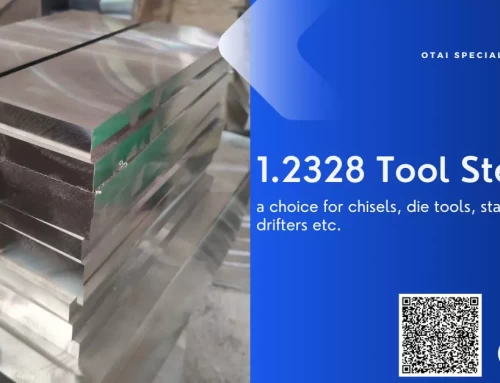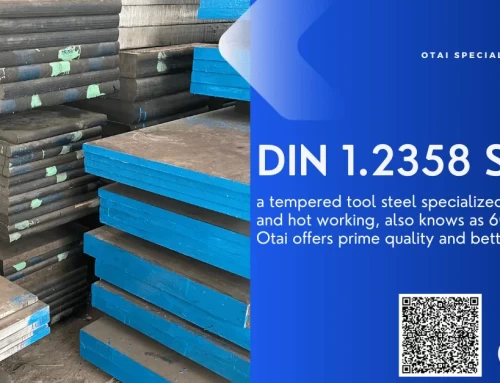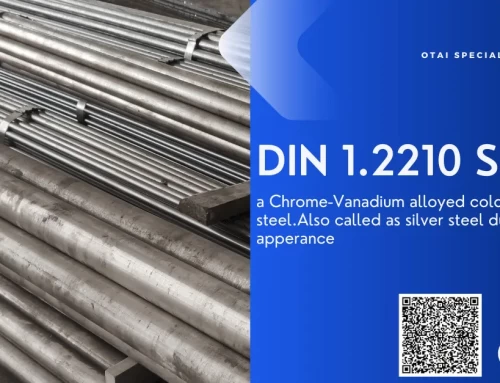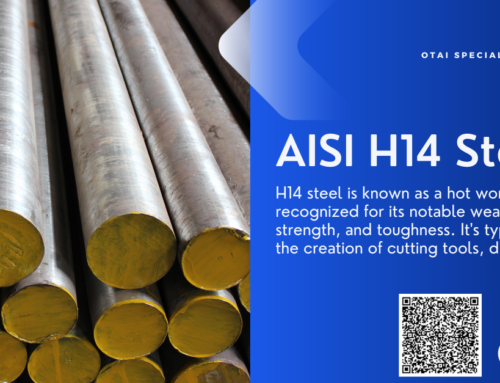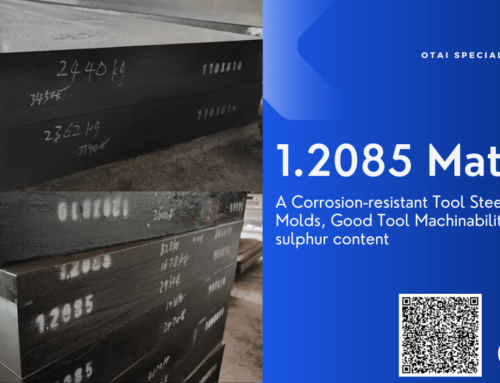What is 1.2367 Steel?
DIN 1.2367 steel, also known as X38CrMoV5-3, is a hot work tool steel characterized by its exceptional toughness, high-temperature strength, and excellent resistance to heat-checking. These qualities make it a preferred choice for numerous industrial applications, offering exceptional performance even under extreme conditions.
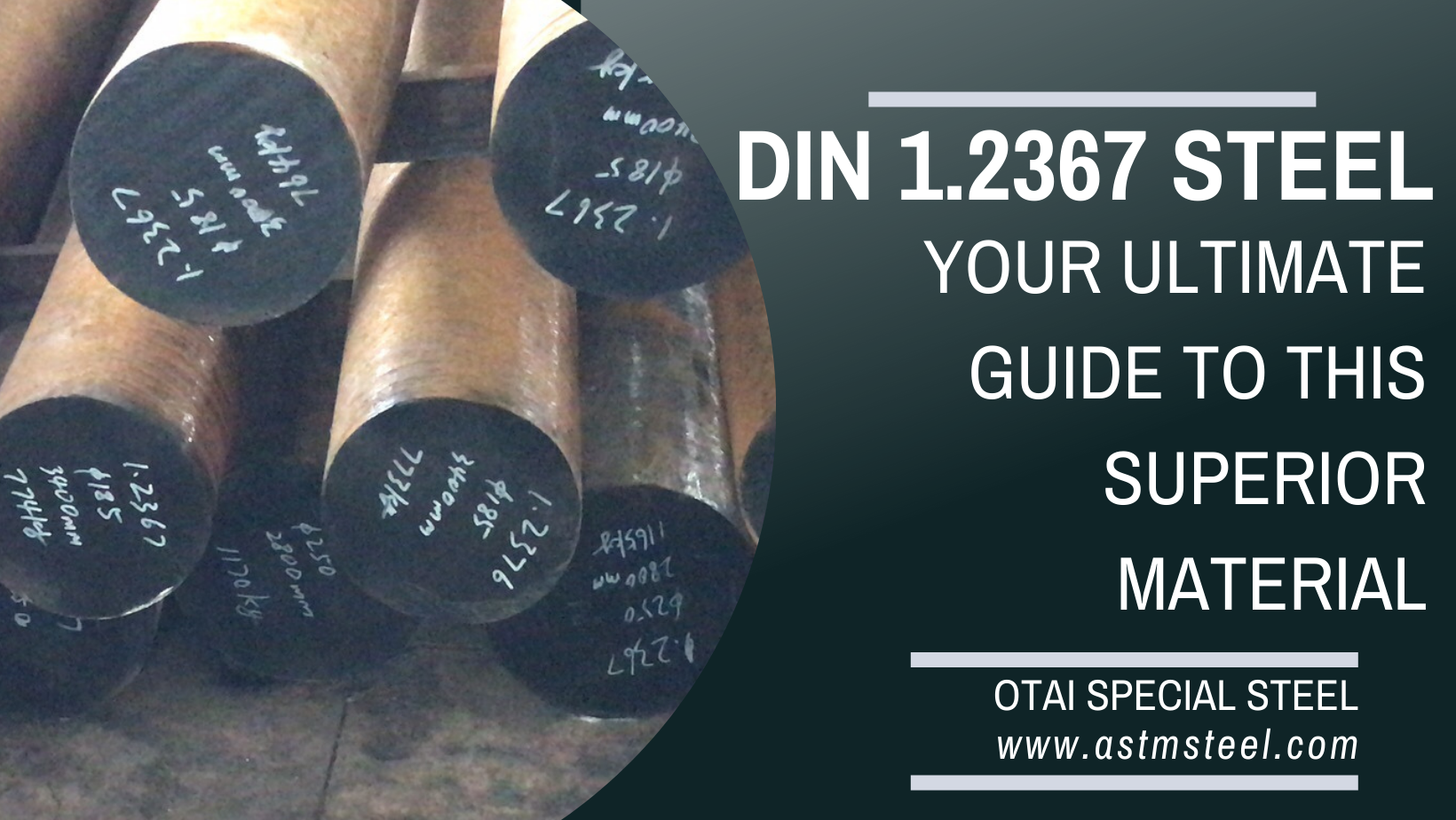
1.2367 Steel Standards and 1.2367 Equivalent Grades
1.2367 steel conforms to the DIN EN ISO 4957 standard, a globally accepted standard for tool steels. It’s crucial to note that while 1.2367 steel has equivalents, each variant differs in its specific composition and properties. Some of its common equivalent grades include:
| Equivalent Steel Grades | Standards |
|---|---|
| X38CrMoV5-3 | EN ISO 4957 |
| AISI H11 | AISI |
| SKD6 | JIS |
| 4Ch5MFS | GOST |
Chemical Composition of 1.2367 Steel and its Equivalents
1.2367 steel boasts a distinct chemical composition that underpins its unique properties. Below, we compare its composition to its equivalent grades:
| Steel Grade | Carbon | Chromium | Molybdenum | Vanadium | Silicon |
|---|---|---|---|---|---|
| ISO 4957 1.2367/X38CrMoV5-3 | 0.38-0.40 | 4.80-5.20 | 2.70-3.20 | 0.40-0.60 | 0.30-0.50 |
| AISI H11 | 0.35-0.45 | 4.75-5.5 | 1.1-1.6 | 0.3-0.6 | 0.8-1.25 |
| JIS SKD6 | 0.32-0.42 | 4.5-5.5 | 1.0-1.5 | 0.3-0.5 | 0.8-1.2 |
| GOST 4Ch5MFS | 0.35-0.40 | 4.8-5.3 | 2.5-3.0 | 0.3-0.6 | 0.3-0.6 |
DIN 1.2367 Steel Mechanical Properties
Steel 1.2367 is recognized for its excellent mechanical properties, including high tensile strength and toughness. These characteristics make it particularly suitable for high-pressure die casting and extrusion.
Although exact mechanical properties can depend on heat treatment and other processing, here are some general characteristics:
-
Hardness: After annealing, its hardness is typically around 235 HB (Brinell hardness). After quenching and tempering, its hardness can range from 50-52 HRC (Rockwell hardness).
-
Yield Strength: This depends on heat treatment, but can typically be around 1200-1400 MPa.
-
Tensile Strength: This can also be heat treatment dependent, but you might expect a range of approximately 1400-1600 MPa.
-
Good toughness: This steel is designed to withstand high temperatures and stresses without failing, making it suitable for applications like die casting.
-
Good thermal conductivity and low coefficient of thermal expansion.
Steel 1.2367 Heat Treatment
For 1.2367 material to realize its full potential, it must undergo heat treatment processes. These include annealing, hardening, and tempering. The heat treatment helps enhance its toughness, heat resistance, and wear resistance.
The exact heat treatment process will depend on the specific requirements of the application. However, a typical process might involve the following steps:
-
Annealing: Heat slowly to 800-850 °C, hold until the entire piece is heated through, and then cool in the furnace at a rate of 10 °C/hour to 600 °C, then freely in air.
-
Hardening: Preheat to 650-700 °C, then heat rapidly to the final hardening temperature of 1020-1050 °C, soak in this temperature until the piece is heated through, and then quench in oil or in the air.
-
Tempering: After hardening, the steel needs to be tempered to reduce brittleness. This involves reheating the steel to a temperature between 550-600 °C, depending on the desired hardness (lower temperatures result in higher hardness), and holding it at that temperature for a period of time before cooling in air. The tempering process can be repeated multiple times to achieve the desired properties.
-
Stress relieving: If necessary, a stress-relief process can be performed after rough machining. This process generally involves heating to a temperature of around 650-700 °C, holding for a period of time, and then cooling in air.
Availability of 2367 Steel
DIN 1.2367 steel is available in various forms, including steel plate and round bar here at Otai.
Plate is available with thickness 10-800mm x width 300-900mm with random length 2000-5800mm.
Round bar is available with diameter min 8mm to max 600mm and random length.
This tool steel is usually available in annealed condition with max 229HB. You can also do the heat treatment to achieve min 50HRC, depending on different heat treatment procedure.
DIN 1.2367 Steel Price
As for the price, it’s subject to market fluctuations and the specific requirements of your project. Contact us for the most accurate and competitive quote.
DIN 1.2367 Material Applications
DIN ISO 1.2367 is used across a broad spectrum of industries. Its ability to withstand high temperatures and pressures makes it particularly suitable for certain industrial applications.
Here are some common applications of 1.2367 steel:
-
Die Casting Dies and Inserts: The steel’s ability to withstand high pressures and temperatures makes it suitable for use in die casting, where molten metal is forced into a mold under high pressure.
-
Extrusion Tools: Extrusion involves forcing material through a die to create a specific shape. 1.2367 steel is commonly used to make the tools for this process due to its durability and heat resistance.
-
Plastic Mold Industry: This steel is also used in the plastic mold industry, especially where high wear resistance is required.
-
Hot Shear Blades: The toughness and hardness of this steel make it a good choice for hot shear blades, which need to withstand high temperatures and pressures.
-
Hot Punching Tools and Forging Dies: These tools also need to withstand high temperatures and pressures, and 1.2367 steel is a common choice for these applications.
-
High-Stress Parts: This type of steel can be used in high-stress parts in machinery or industrial equipment where durability and heat resistance are needed.
Conclusion
1.2367 steel is a formidable material, offering unrivaled toughness, high-temperature strength, and heat-checking resistance. Whether you’re in the automotive, aerospace, or tooling industry, this unique steel type 1.2367 could be the game-changer you’ve been seeking. Contact us today for your inquiries.
FAQs
1. What are the key characteristics of 1.2367 steel?
1.2367 tool steel stands out for its remarkable toughness, high-temperature strength, and superior resistance to heat-checking.
2. What are the equivalent grades of 1.2367 material?
Equivalent grades include X38CrMoV5-3, AISI H11, SKD6, and 4Ch5MFS.
3. What is the standard for 1.2367?
Steel 1.2367 conforms to the ISO 4957 standard.
4. What applications are best suited for 1.2367 steels?
It is extensively used in die-casting tools, extrusion tools, forging dies, hot shear blades, and punches.
5. How can I purchase 2367 steel?
You can easily acquire 1.2367 steel in various forms, like steel plate and round bar, from us. Contact us today for a professional quote.

